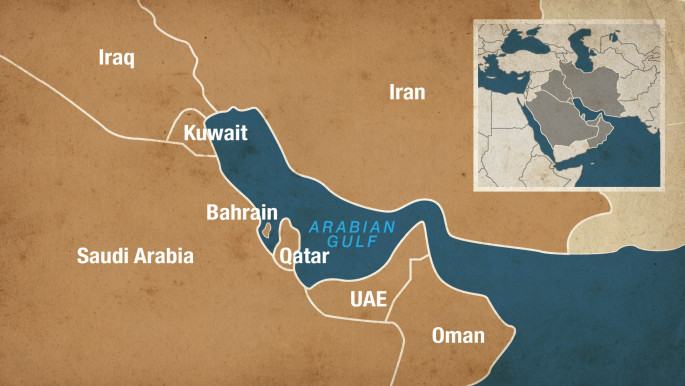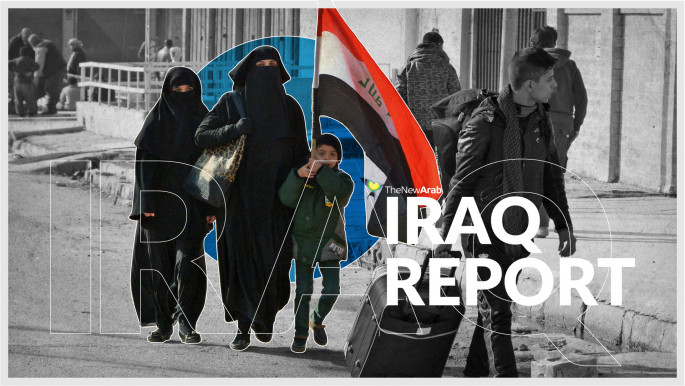
Iraq: Battleground or bridge for regional rivals?
Attempting to break the dominance of its regional rival, Iran, over Iraqi affairs, Riyadh has sought to entice Baghdad with the carrot of much needed investments and energy deals.
The reopening of the Saudi consulate in Baghdad for the first time in almost 30 years came with further pledges from Riyadh, including $1 billion for investments, an additional $500 million to boost exports, and the gift of a new 100,000-seat sports stadium. According to Saudi Trade Minister, Majid bin Abdullah al-Qasabi, this marks a "new phase" in the pair's relations.
But with Iranian influence so deeply ensconced in Baghdad, Saudi Arabia's goal of diluting the influence of their regional nemesis will not be easy.
Ties between Iraq and the Saudi Kingdom were effectively severed after the Iraqi invasion of Kuwait in 1990. Saudi Arabia was part of the US-led coalition that pushed Iraqi dictator Saddam Hussein out of Kuwait with Iraq firing several scud missiles at Riyadh and other towns in response.
The fact that the visit of Saudi Foreign Minister, Adel al-Jubeir, to Iraq in 2017 was the first such visit by a Saudi foreign minister since 1990, tells its own story about their diplomatic relations.
However, it was the Second Gulf War and the removal of Hussein in 2003 that cemented tensions. Iranian influence post 2003 grew unparalleled, as Shia parties - many with historical links to Tehran - came to power.
Iranian influence in Baghdad has grown exponentially since then, much to the dismay of the United States, who have invested heavily in the vision of new western-leaning Iraq.
 |
Iranian influence in Baghdad has grown exponentially since then, much to the dismay of the United States |  |
Meanwhile, Saudi suspicions of the Baghdad-Tehran axis have hardened as Arab Sunnis were marginalised and Shia dominance over military and political circles took hold.
Prior to the Islamic State (IS) taking parts of Iraq in 2014, Riyadh's response to Iranian dominance and newfound Shia hegemony in Iraq, was in part through support for Sunni groups. Waves of sectarian violence and continued Sunni disenchantment eventually helped fuel the rise of IS.
Ultimately, Riyadh's goal of hindering a regional rival through a proxy showdown in Iraq was not sustainable, and had limited gains. On the contrary, the dominance of Tehran and Shia monopolisation of power increased, much to the dismay of Riyadh and Washington.
While US-led coalition forces may have patrolled the skies in the fight against IS, on the ground, the decisive hand of Iran was clear to see.
 |
|
It was the Shia dominated and Tehran-backed Popular Mobilisation Forces (PMF) that were crucial in the push back of IS. The PMF continues to enjoy dominance today, with many of its leaders, with historically close ties to Iran, now joining the political fold.
The Saudi charm offensive in Iraq may have begun a few years ago, but present geopolitical realities have opened an unprecedented door to both sides.
Regional tensions over Iran's policy in Yemen and Syria have put it at direct odds with Saudi Arabia, but the role of Washington has been a key push.
Washington, having quit the nuclear deal with Iran a year ago, is now enacting a campaign of "maximum pressure" against Tehran, in part to hinder its increasing clout across the region, including support for Assad's regime in Syria, and proxy forces in Lebanon.
Read more: Iran accuses US of 'unacceptable' escalation in tensions
However, for Washington or Riyadh to achieve their aims, the starting point must be Baghdad.
The new push to improve ties with the Saudis under Iraqi Prime Minister Adil Abdul-Mahdi is a continuation of US efforts under former Iraqi Prime Minister Haider al-Abadi to reduce Iranian sway over Iraq.
Baghdad not only enjoys strong political and religious ties with Tehran, but the economic and energy foothold is significant.
 |
|
Even for a country with one of the largest oil reserves in the world, it has relied heavily on energy imports from Iran, especially electricity and gas supplies.
In contrast, economic and trade ties between Baghdad and Riyadh were almost non-existent. A strategic oil pipeline through Saudi territory has been closed for decades, as have consular services and key border crossings.
As Saudi Arabia has realised, to make political inroads in Baghdad, the starting point must be much stronger economic ties, and the dissolution of Iranian dominance over the Iraqi energy sector.
One-step in this regard is Saudi Arabia's pledge to launch a 3,000 MW capacity solar power plant near the Iraqi border to export electricity at a discounted price.
This serves as an incentive for Baghdad, whose government needs billions in post-IS reconstruction efforts, and whose heavy dependence on Tehran for its electricity needs is a risk that could quickly lead to socio-political blowbacks.
Tehran's sudden cut to electricity imports in the summer of 2018 led to widespread anger and protests, especially in the restive city of Basra.
 |
For Washington or Riyadh to achieve their aims, the starting point must be Baghdad |  |
Then, there is pressure by US to end sanction waivers with Iran. It has given Baghdad temporary respite, but the US has also invested too heavily in Baghdad to stand by as Iran continues to enjoy an unprecedented hand in the Iraqi political and economic arena.
While the strong ties between Iraq and Iran are not about to disappear, the aforementioned energy and political pressures mean that Baghdad has to strike a much finer balance between its western backers and other key players in the region.
In theory, as long as Baghdad is the benefactor between the increased Saudi-Iranian rivalries, then it will come out stronger. Nevertheless, this balance is not easy to maintain.
The fact that in April, Prime Minister Abdul-Mahdi visited Tehran and Riyadh in quick succession, highlights the delicate political balance.
In fact, Iranian President Hassan Rouhani also visited Iraq as recently as last month, with Tehran seeking to bolster its annual trade with Iraq from $12 billion to $20 billion.
 |
The balance of acting as a broker between the US, Saudi and Iran is more complicated than simply signing deals |  |
Abdul-Mahdi has previously stressed the principle of "being open towards all the neighbouring countries," and ending existing disputes and historic sticking points, in clear reference to previous animosity with the Saudis.
"Economic relations incubate a better political and security environment," emphasised Mahdi.
On his visit to Saudi Arabia, he signed 13 agreements in areas such as trade, energy and political cooperation. But the balance of acting as a broker between US, Saudi and Iran is more complicated than simply signing deals.
Closer ties with Saudi Arabia may accelerate political and sectarian divides in Iraq. While there are those who would welcome warmer relations, others rely heavily on close cooperation with Tehran and see new Saudi ties with Iraq as a threat on a number of levels.
For example, Abdul-Mahdi is unlikely to be able to reign-in the PMF, let alone dissolve the organisation, as demanded by Riyadh and Washington, as the political and social damage could paralyse his tenure even before it has truly begun.
In 2016, Shia militias attacked the newly reopened Saudi embassy in Baghdad in response the Saudi execution of a prominent Shia cleric, highlighting the breadth of mistrust that remains.
For now at least, Iraq is more likely to remain a battleground than a bridge between various internal factions and regional actors.
Bashdar Ismaeel is a writer and geopolitical, energy and security analyst.
Follow him on Twitter: @BashdarIsmaeel
Opinions expressed in this article remain those of the author and do not necessarily represent those of The New Arab, its editorial board or staff.




